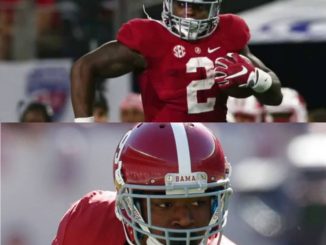
TUSCALOOSA, AL—Alabama quarterback and Heisman Trophy candidate Ty Simpson has signed a lucrative, multi-year NIL agreement with Southeast First Bank & Trust.
The unprecedented nature of the deal stems from the fact that Southeast First Bank & Trust is the official, long-standing “Premier Financial Partner” and a major corporate stadium-level sponsor for the Auburn Tigers, Alabama’s fiercest rival.
The financial details of the agreement were not officially disclosed, but industry analysts familiar with Simpson’s burgeoning NIL portfolio currently valued by On3 at just under $1 million—suggest the deal is worth well over $500,000 annually, making it one of the largest regional NIL partnerships in college football. The contract reportedly requires Simpson to star in a regional advertising campaign, make several branch appearances across the state, and maintain an active social media presence promoting the bank’s digital services.

This agreement marks the first known instance in college sports of a prominent, active player signing an individual NIL deal with the primary, institutional-level corporate sponsor of their program’s most bitter and direct rival. The tradition-laden nature of the Alabama-Auburn rivalry—often referred to simply as the Iron Bowl—adds layers of complexity and controversy to the arrangement.
“This is an absolute game-changer, and a sign of how cold the business of NIL has become,” said Blake O’Toole, a sports marketing professor at the University of Tennessee, Knoxville. “Before NIL, this would have been functionally impossible. The lines between a player’s personal brand and the university’s institutional partnerships were sacrosanct. Now, that wall is totally gone.
A brand like Southeast First Bank & Trust is simply following the eyeballs and star power, even if those eyes belong to their rival’s fan base.”
For Southeast First Bank & Trust, the calculus is clear: tap into the massive star power and brand awareness of one of college football’s most visible players, regardless of the school colors he wears on Saturdays.
“We are delighted to partner with Ty Simpson, a young man who exemplifies excellence, leadership, and performance,” said Chief Marketing Officer Sarah Jennings in a brief statement. “Our commitment is to all people of the Southeast region. Ty’s brand aligns perfectly with our vision for the future.”
However, the reaction from the Auburn fan base has been explosive. Social media platforms immediately erupted with calls for a boycott of the bank, with many fans posting photos of their cut-up bank cards.
Auburn’s NIL collective, War Eagle Advantage, which is partially funded by donations from rival banks, released a terse statement acknowledging the fluid nature of the NIL market but stressed their commitment to “preserving the integrity of our Auburn family.”
For Ty Simpson, the deal adds to a rapidly growing portfolio that already includes national brands like Gatorade and Hugo Boss, alongside local staples like Harbin Automotive and the ‘Yea Alabama’ collective. His agent, Marisa Chen of QB Reps, defended the move, stating, “Ty’s career is a business, and his brand transcends any single rivalry. This deal simply confirms his status as one of the most commercially valuable athletes in the country.”
While university athletic departments cannot legally interfere with a student-athlete’s private NIL dealings, the emotional and institutional implications are substantial. Coaches, who have historically relied on a unified corporate front, must now contend with their star player promoting a rival’s primary financial partner.
The agreement comes just weeks before the two teams are set to clash in the season’s finale, guaranteeing that the sight of Ty Simpson promoting Southeast First Bank & Trust will be a central—and likely infuriating subplot for Tiger fans in the run-up to the Iron Bowl. The unprecedented endorsement crossover is a stark reminder that in the NIL era, traditional loyalties are increasingly being overshadowed by market opportunity, fundamentally changing the definition of a “college athlete.”



Be the first to comment